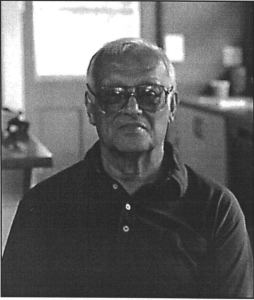Richard Furtado

Tsunamis Remembered: Oral Histories of Survivors and Observers in Hawai‘i
Life history interviews with individuals who witnessed and survived tsunamis-particularly the 1946 and 1960 disasters on the Big Island of Hawai'i. Thirty individuals-mostly residents of Hilo and Laupahoehoe-recall their experiences before; during, and after the 1946 and 1960 tsunamis which were arguably the most destructive natural disasters in modem Hawaiian history.
The third of six children, Richard Furtado, was born in Lahaina, Maui on July 15, 1913 to Lucy Napelakaukau Furtado and Antonio D. Furtado. His mother was Hawaiian-Chinese; his father, a Portuguese immigrant who arrived in the islands at the age of four. His paternal grandparents from the Azores worked in the sugar industry. Later, his grandfather and father were in the meat business. The Furtados at one time owned the only meat market and slaughterhouse in Lahaina; they made and marketed Portuguese sausages throughout the territory. The Furtados continued to operate the meat business until the 1932 election of President Franklin Delano Roosevelt. As the only known Democrat in Lahaina, Antonio Furtado was appointed postmaster. Richard Furtado attended Kamehameha III School in Lahaina and Punahou School in Honolulu. The 1931 Punahou graduate earned a bachelor's degree in business and accounting from the University of Hawai'i at Manoa in 1936. Before completing his college degree he married Juliette Simpson with whom he would have and raise four children. In the 1940s he was employed by Consolidated Amusement Company and American Sanitary Laundry. For more than thirty years, 1945-78, he was a restaurateur in Hilo. He was the proprietor of The Ponds, The Lanai, Bobbie's Steak and Lobster, and The Hibachi. During the 1946 tsunami both his rented home and business in the Keaukaha district were destroyed. In 1960, his home garage was flooded and walls damaged; his restaurant did not sustain structural damage but furnishings were lost. Richard Furtado is now retired and resides with his wife, Juliette, on the Big Island. The interview was conducted in his Hilo bayfront home.
Scope and Content Note
Lahaina-born restauranteur shares memories of his family's meat market, including sausage making and peddling. He tells of escaping the 1946 tsunami, which destroyed his rented home and restaurant in Keaukaha. He also speaks of the 1960 tsunami, which washed away a home he had built in Keaukaha. Also contributing to the interview was his wife Juliette Furtado.
Program Note:
This interview is part of the Center for Oral History's project Tsunamis Remembered: Oral Histories of Survivors and Observers in Hawai‘i. Interviews from this project are available in the Center's ScholarSpace open access repository.
The Center for Oral History (COH), in the Department of Ethnic Studies at the University of Hawaiʻi at Mānoa, collects, documents, preserves and highlights the recollections of Native Hawaiians and the multi-ethnic people of Hawaiʻi. It produces oral histories and interpretive historical materials about lifeways, key historic events, social movements and Hawaiʻi’s role in the globalizing world, for the widest possible use.
Please Note: The oral histories in this collection are protected by copyright and have been created for educational, research and personal use as described by the Fair Use Doctrine in the U.S. Copyright law. Please reach out Voices@noaa.gov to let us know how these interviews are being used in your research, project, exhibit, etc. The Voices staff can help provide other useful resources related to your inquiry.
The NOAA mission is to understand and predict changes in climate, weather, oceans, and coasts, to share that knowledge and information with others, and to conserve and manage coastal and marine ecosystems and resources. The Voices Oral History Archives offers public access to a wide range of accounts, including historical materials that are products of their particular times, and may contain offensive language or negative stereotypes.
Voices Oral History Archives does not verify the accuracy of materials submitted to us. The opinions expressed in the interviews are those of the interviewee only. The interviews here have been made available to the public only after the interviewer has confirmed that they have obtained consent.
